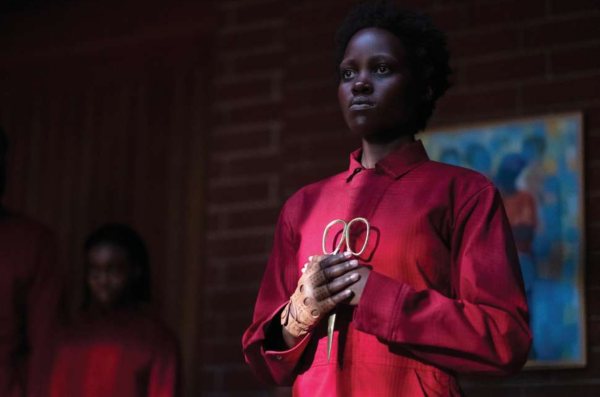Horror is a fertile ground for satire and allegory, and Us overfertilizes to the nth degree. The single potent metaphor of the Sunken Place powered Get Out, and that potency in Us is spread amongst several signposts, including rabbits, scissors, and Hands Across America, of all things. The surplus of symbols is diluting, with some coming full circle and others included for color. Peele’s specific kind of auteurism means that everything comes in for interrogation, whether it’s meant to or not, and Us is so crowded that it breaks the film with nonstop invites to consider what this or that means. There’s something here about privilege and class and the duality that anchors all doppelganger films, but it doesn’t synch with the broader mythology that the doppelgangers, referred to as the Tethered, are connected to. The film gradually reveals that every American has a Tethered counterpart, but how does that relate to poorer Americans? What comeuppance is being delivered to them? Us localizes the grand catastrophe that’s unfolding everywhere amongst the Nelsons, but can’t translate their specific circumstances to the wider world, therefore limiting whatever satirical punch Peele intended.
Setting aside the commentary that Peele is clearly going for, as a straight horror film, Us is on firmer ground. This is built solely on the physical performances of the cast as their Tethered halves, with Nyong’o in particular a chilling standout. Already so compelling and charismatic as Adelaide, Nyong’o lets loose as Red, a strange and captivating figure that’s one part minstrel imitation and another part killer clown. Every facial muscle is put to use to unnerve the Wilsons, and the voice further exacerbates the peculiar creation that is Red. Further details, like the way the Tethered communicate with clicks and groans and their strange posture, best exemplified by Heidecker who practiced for this role on his Adult Swim show that he referred to as nightmare fuel, make them into the most memorable part of Us, whether or not their goals or their existence makes any sense within the film.
On the horror comedy front, Us is simply off-putting. There’s no B plot to sequester a lighter tone in here, but Peele stills feels compelled to attempt laughs. They come at the expense of characters who don’t deserve to have their pain laughed at, or through a jokey tone of side-eyes and craned necks that don’t fit alongside a family’s fight for its life. The Wilsons fall prey to that old crutch of being way too comfortable with an upended world, like magic just entered their lives and its as discombobulating as an iPhone update. Some of this could be what the viewer brings to a Peele film, where it’s hard to reconcile the expectation for societal insight with his roots as a comedian and his chosen field of horror. However, Us is trying to check those different and counter-intuitive boxes, and they simply don’t align, resulting in dissonance and tonal confusion.
As brow-furrowing as Us is, it’s far from a deal-breaker from Peele, who remains one of the more anticipated directors in cinema today. Having so nailed Get Out, a follow-up in a similar genre, the so-called social thriller, could only have been judged against it. While Peele is a unique voice who made what could well be one of the most lasting films of the 21st century in his first at-bat, topping that so quickly seems impossible, and merely marks him as human. Us has its charms but not everything can be iconic. One hopes that its biting off more than it could chew is a single hubristic outlier, and not a sign that Peele used up his most fully-formed idea so early. C+

 RSS Feed
RSS Feed